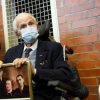Bill Hwang’s Trial to Investigate Novel Manipulation Theory in Archegos Case
As Sung Kook “Bill” Hwang’s criminal trial approaches in New York, his attorneys are poised to challenge prosecutors’ assertions of market manipulation, labeling them unprecedented and illogical. The trial, set to commence with jury selection, marks a significant moment following the collapse of Archegos Capital Management, a $36 billion family office managed by Hwang. Archegos Capital Management imploded dramatically in March 2021 due to failed investments in a handful of stocks via intricate derivatives.
Prosecutors accuse Hwang and his associates of deceiving banks about the extent of Archegos’ derivative positions, enabling them to borrow substantial sums to boost stock prices artificially through market purchases. They contend that Hwang’s purported manipulative tactics were laid bare when the financial house of cards inevitably crumbled, leading to significant losses for global banks.
The trial’s spotlight on Wall Street promises insight into the intricate workings of financial institutions and their interactions with high-risk clients. Joshua Naftalis, a former prosecutor turned partner at Pallas, notes the case’s prominence due to the substantial losses incurred by banks like Credit Suisse. Hwang, recognized for his bold investment strategies, maintains his innocence, dismissing the allegations as an overreach by prosecutors.
Legal experts suggest that proving market manipulation in this context might prove challenging, given the absence of typical deceptive practices associated with such cases. A seasoned attorney with experience defending against market manipulation charges, Robert Frenchman, anticipates the defense’s argument that Archegos’ stock purchases were legitimate.
The trial’s duration, expected to span up to eight weeks, indicates a substantial witness roster. It will likely feature former Archegos executives, including those who have already pleaded guilty to related charges and are cooperating with prosecutors. Additionally, executives from implicated banks are anticipated to testify.
However, given the sophisticated nature of the banking institutions involved, prosecutors may struggle to portray them as sympathetic victims. Naftalis suggests the defense may argue that the banks were fully aware of Hwang’s activities, further complicating the prosecution’s case.
As the trial unfolds, it is poised to provide insights into the complexities of high-stakes finance and the legal boundaries of market behavior, with potentially far-reaching implications for Wall Street practices.








































Comment Template